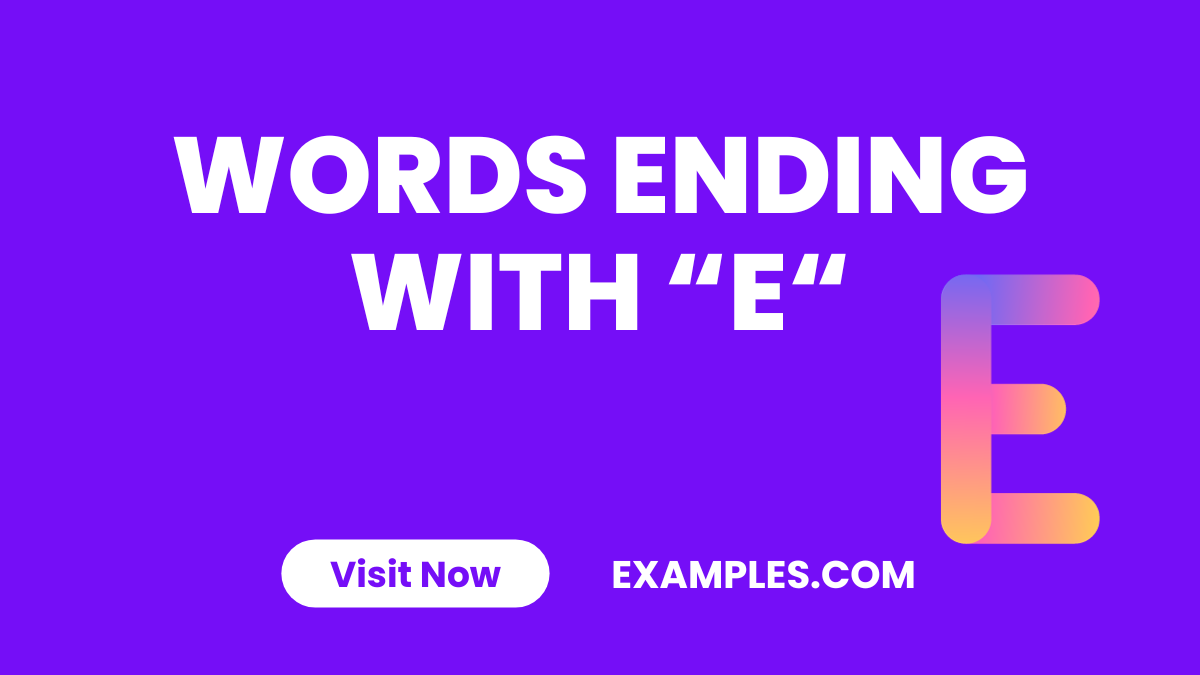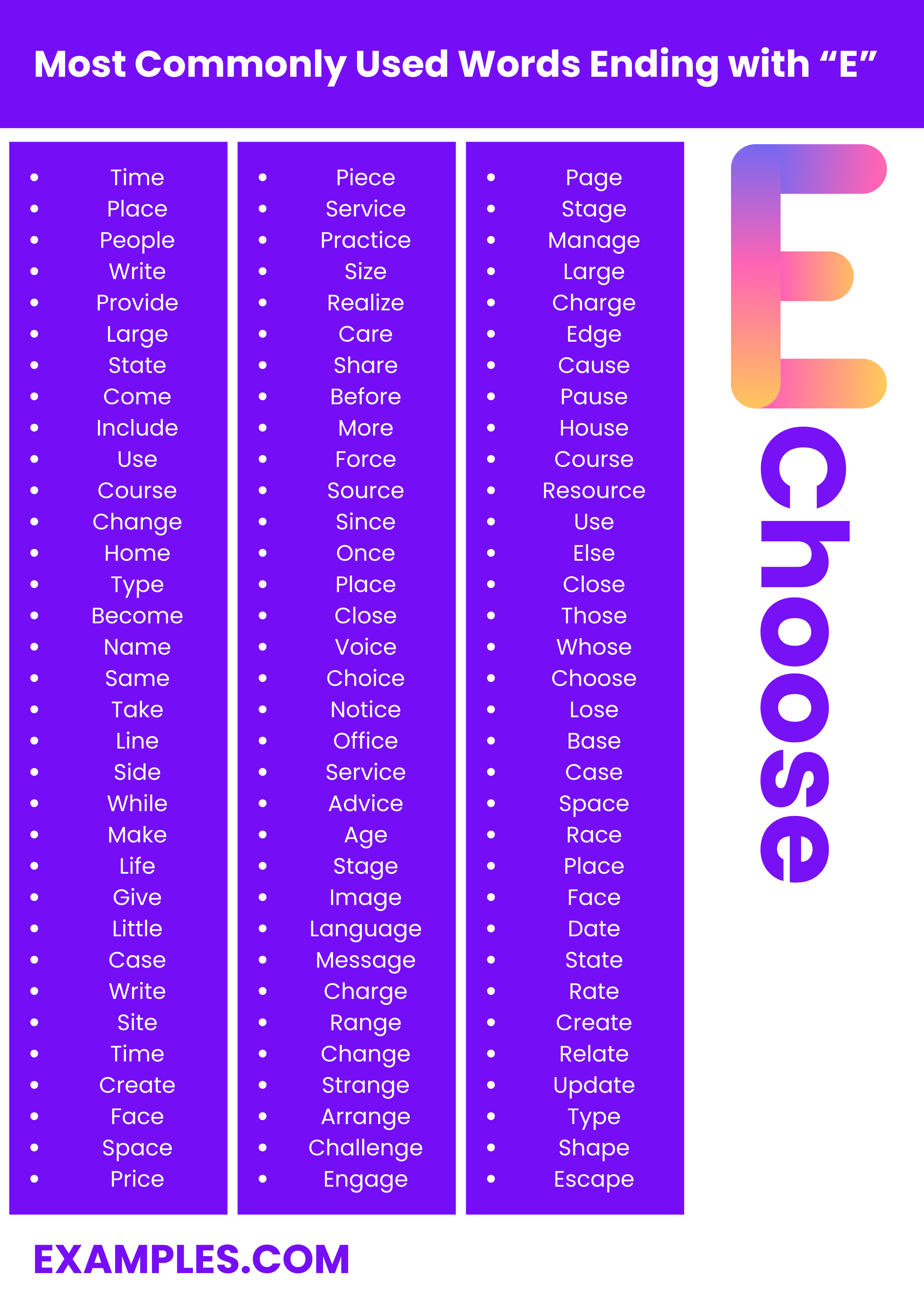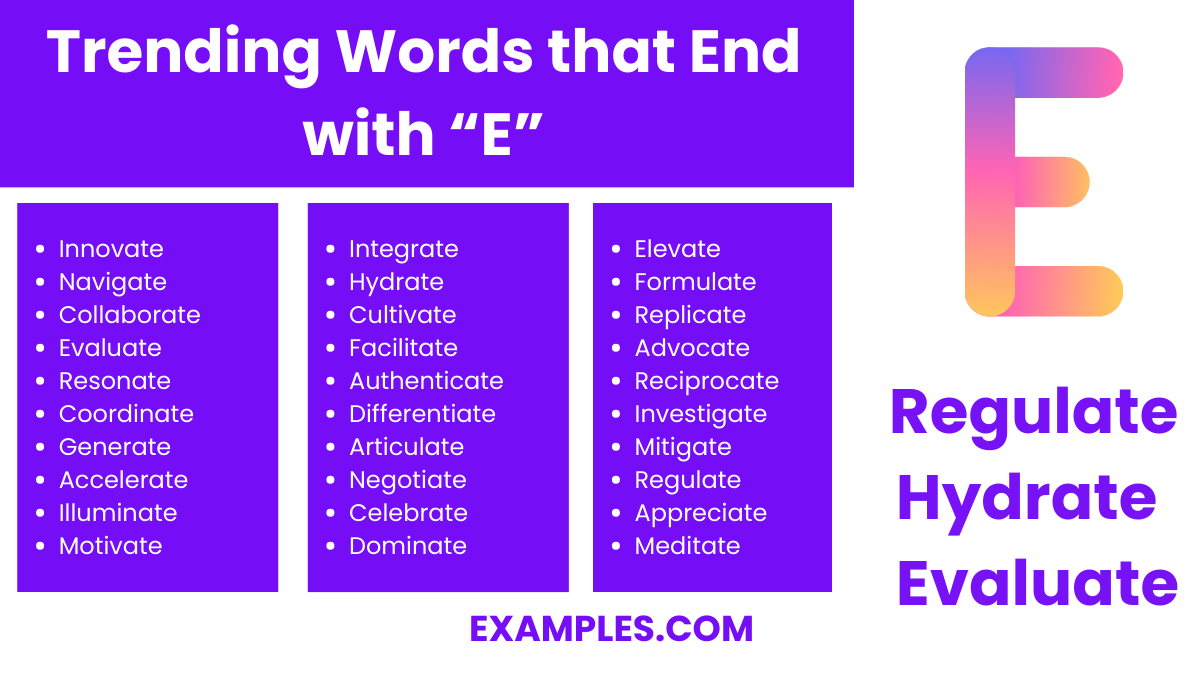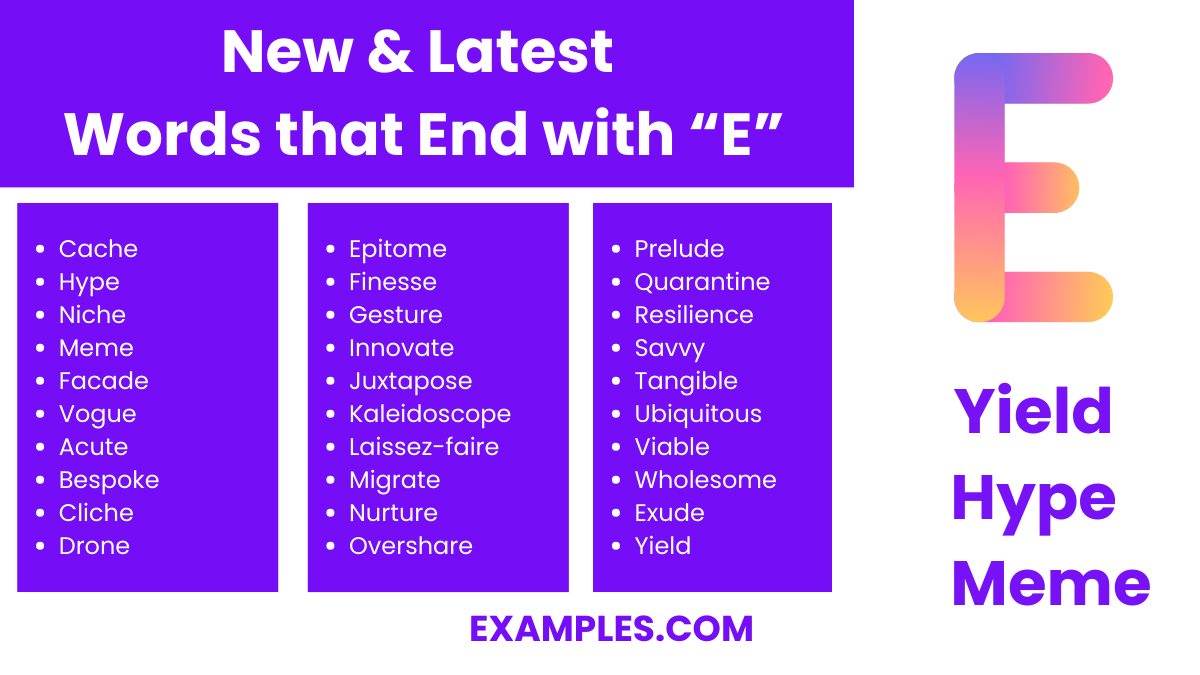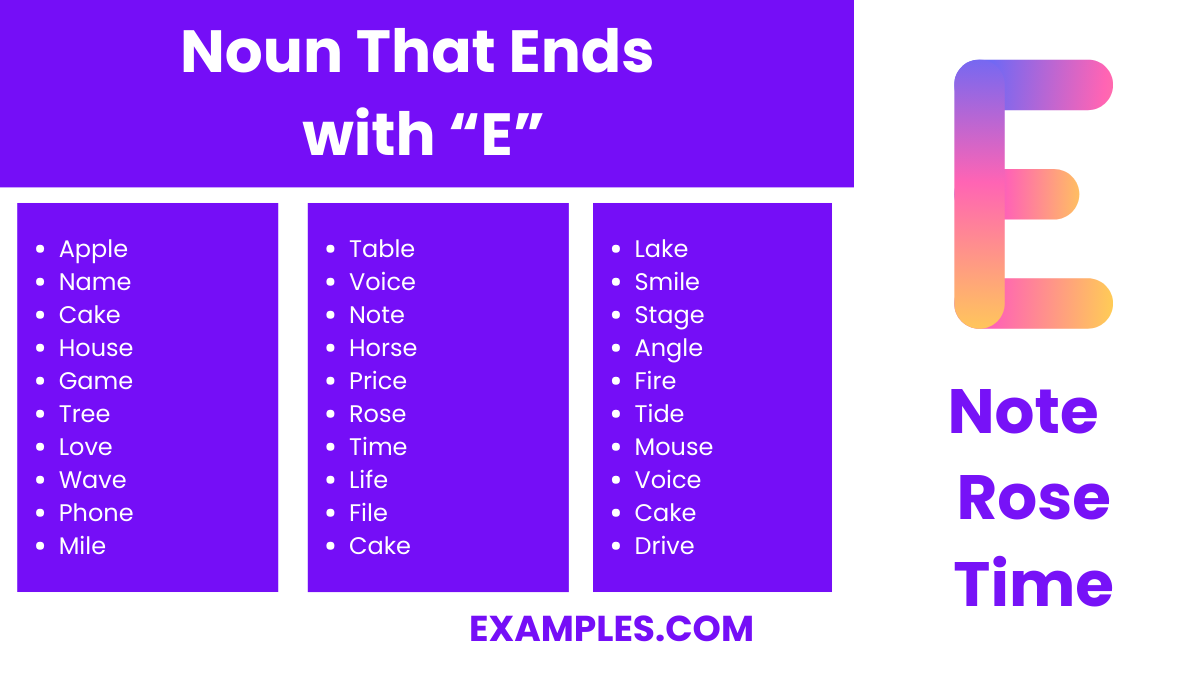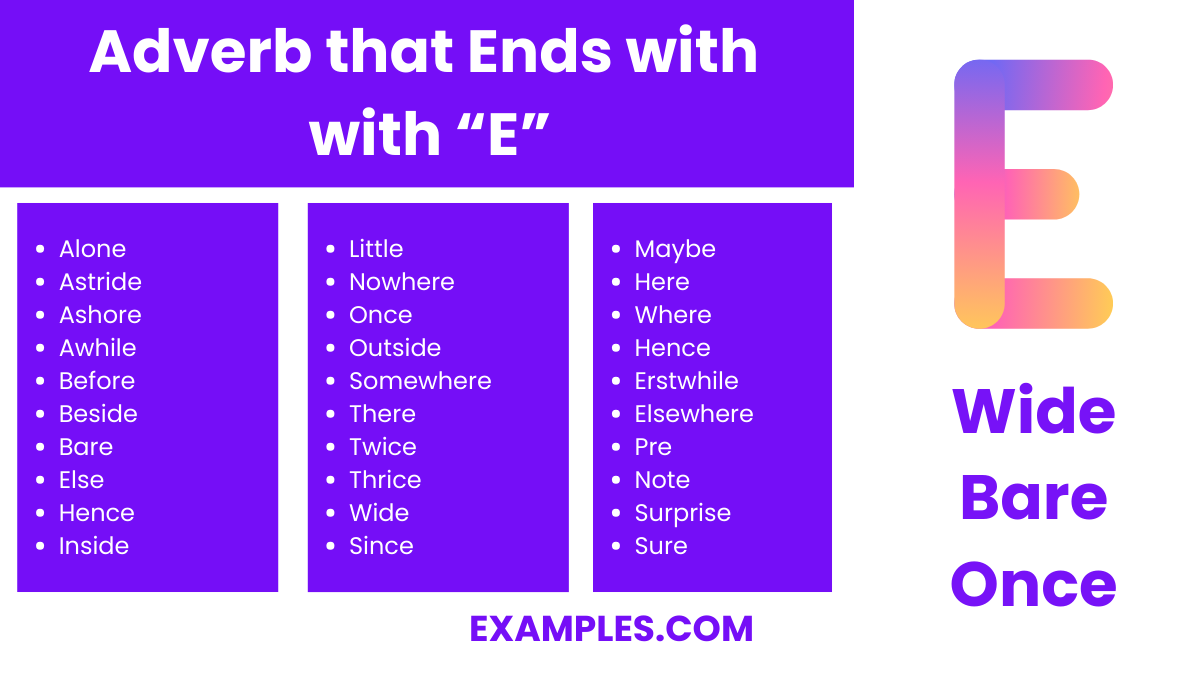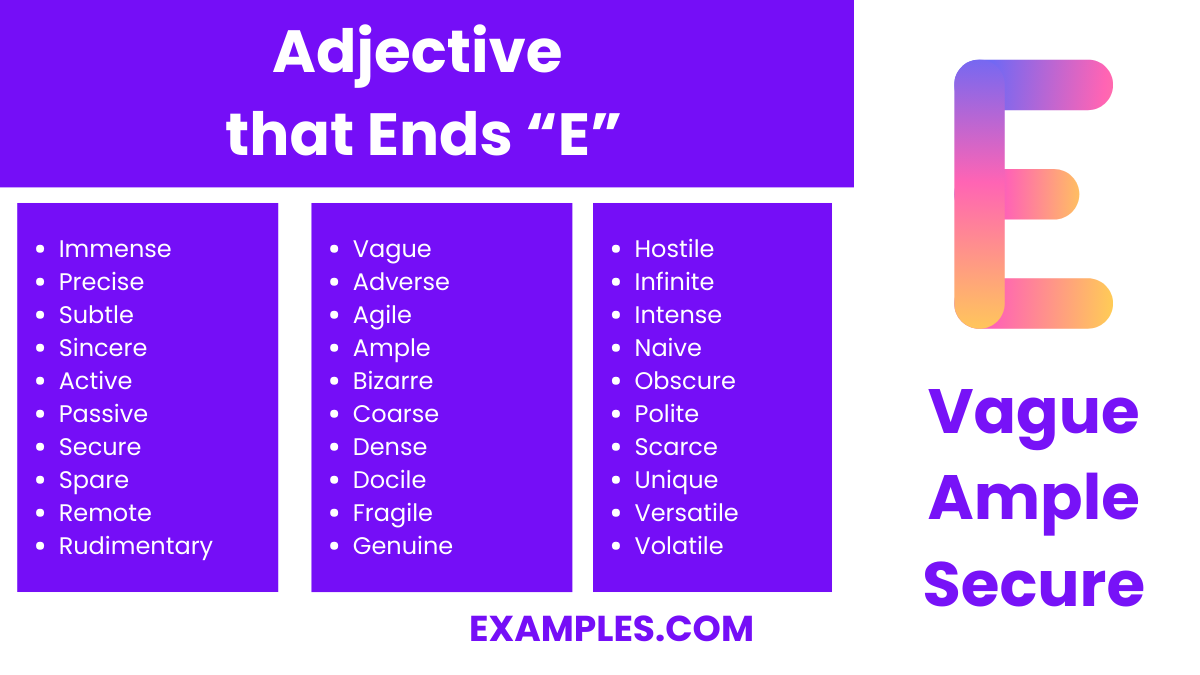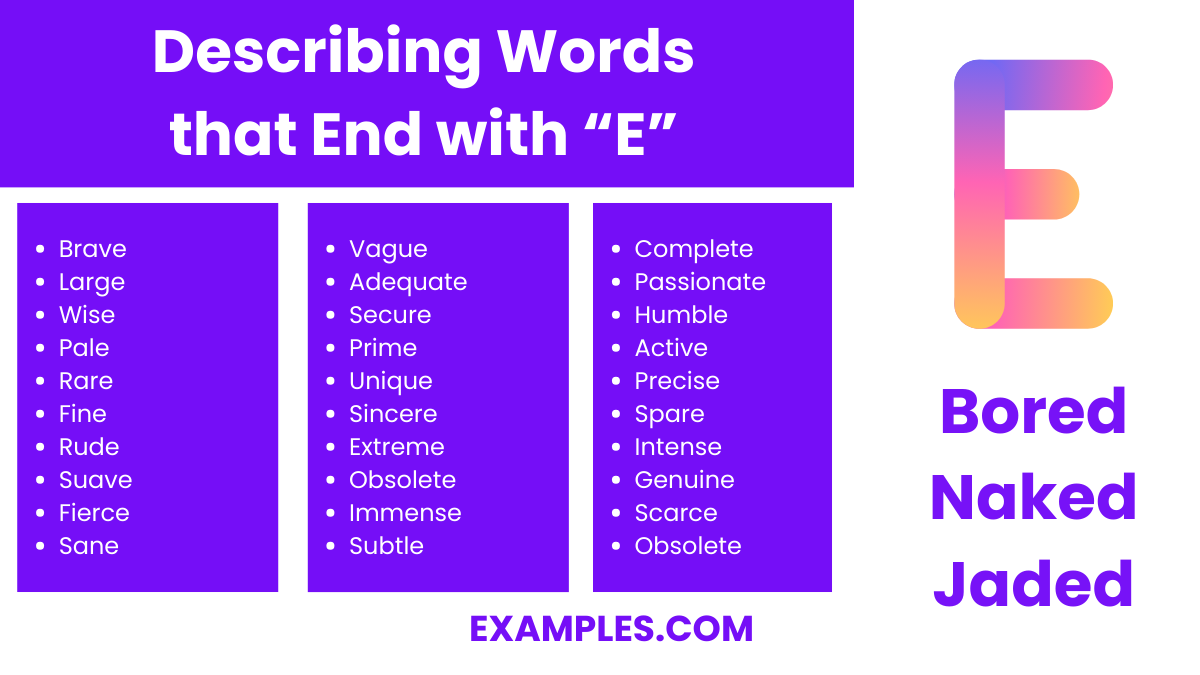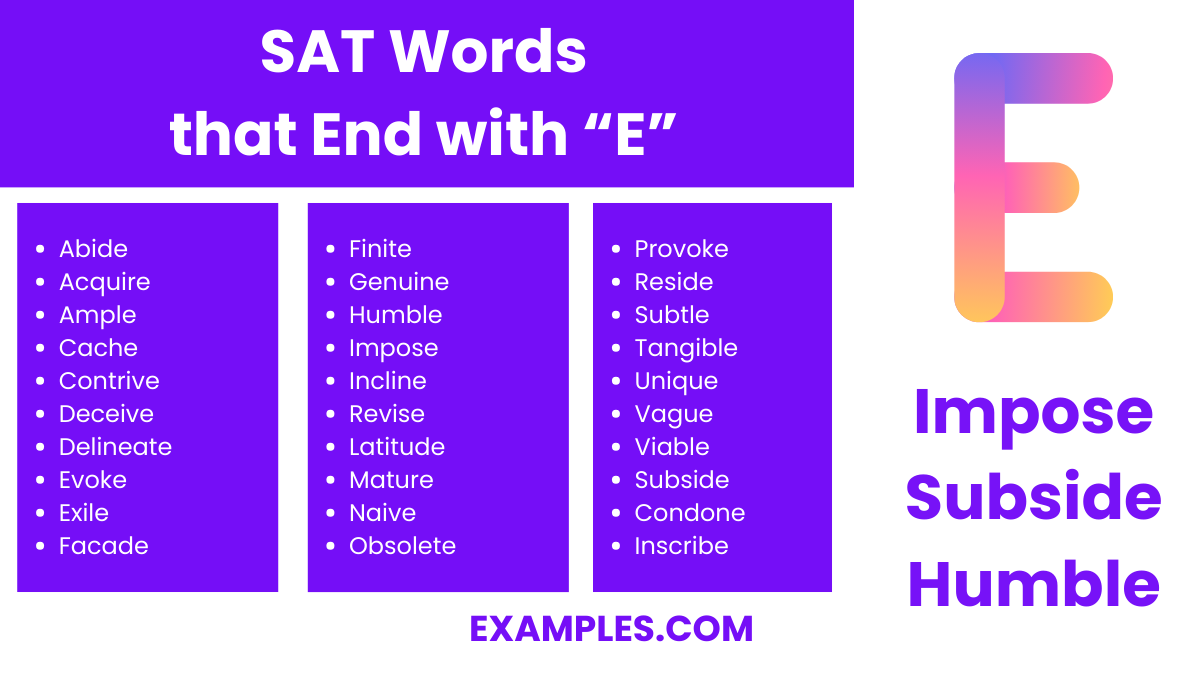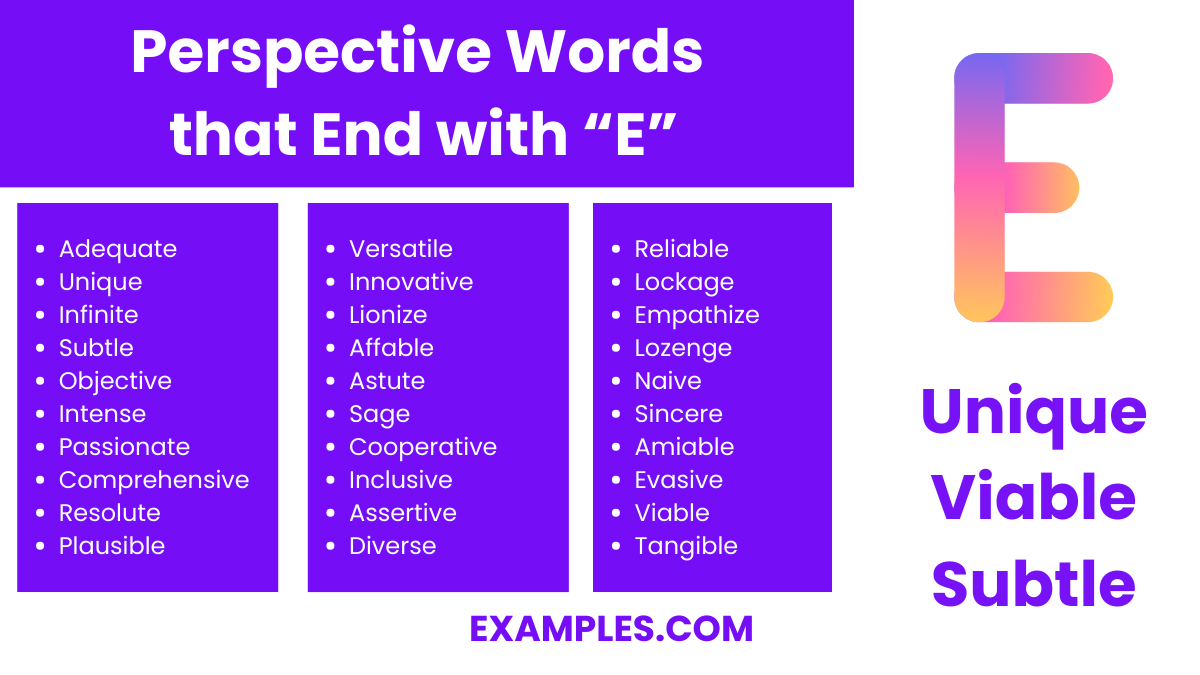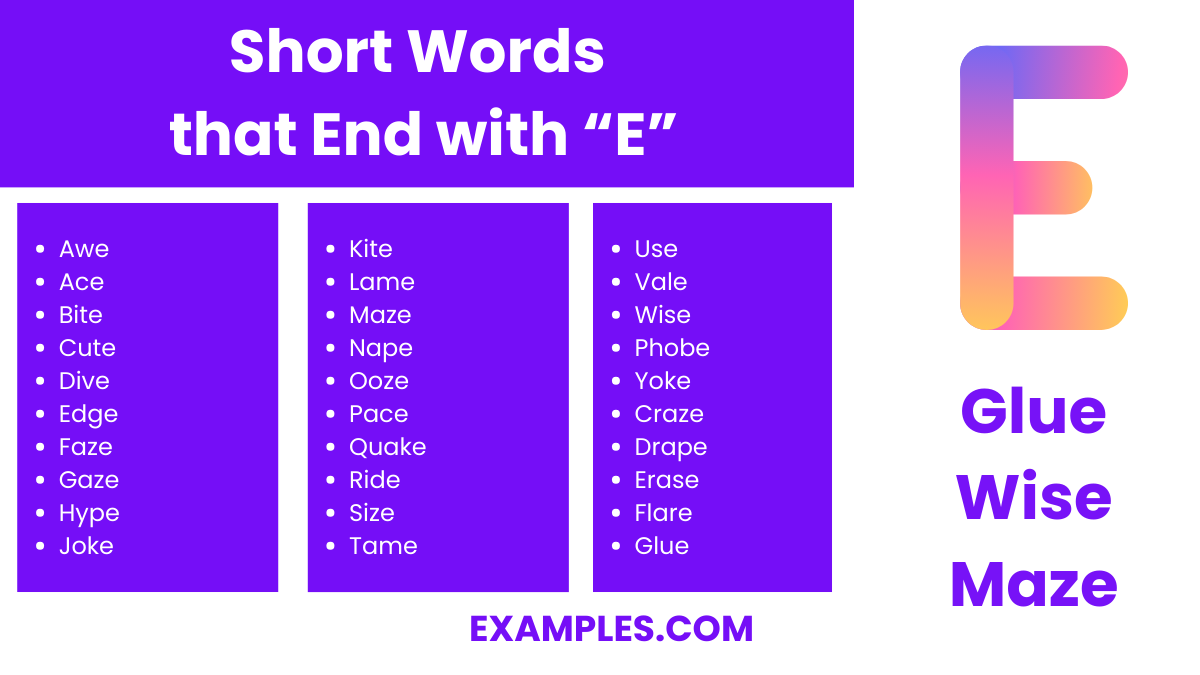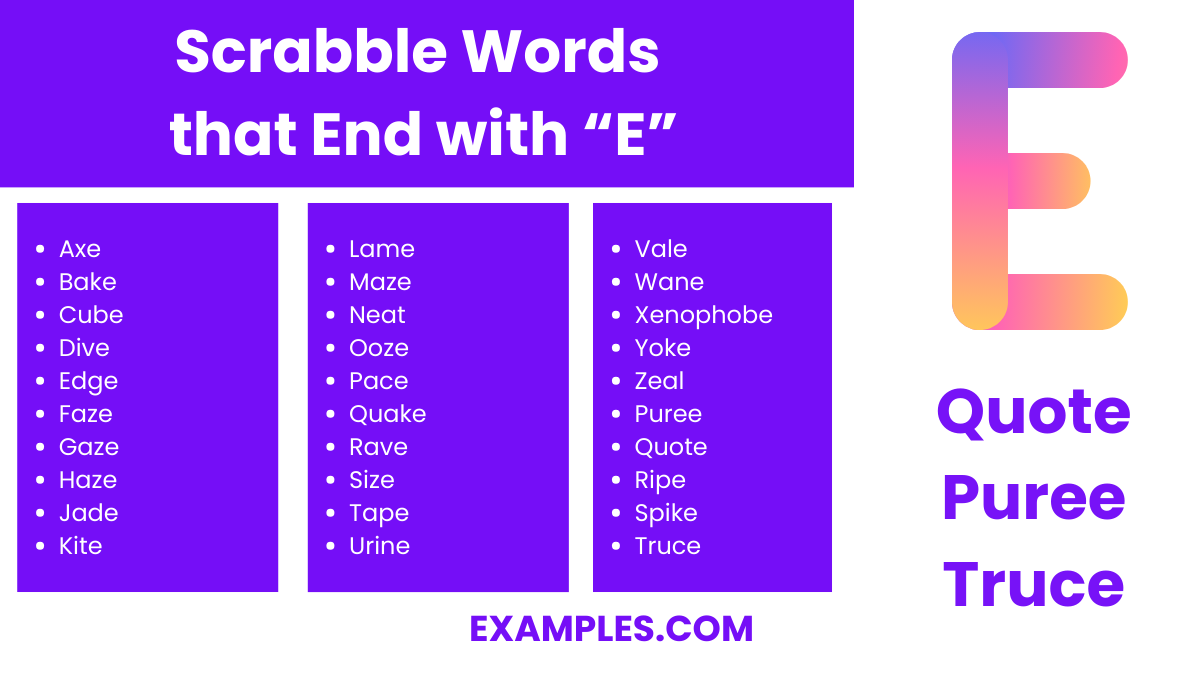150+ Words Ending with E List, Meaning, PDF
Words that conclude with ‘E’ unveils the subtleties of the English language, playing a critical role in sentence formulation. These ending ‘E’ words often transition verbs from present to past tense or morph nouns into adjectives, enriching expression. Educators should highlight the silent ‘E’ principle, which frequently alters a word’s pronunciation, marking it as a cornerstone of phonics learning. Encouraging students to engage with words like “make,” “write,” and “change” not only bolsters spelling abilities and phonetic insights but also elevates overall linguistic acumen, indispensable for proficient communication. This focus on ‘E’ ending words, including “love,” “drive,” and “note,” can significantly refine students’ command of language, fostering a robust foundation for eloquent and effective interaction.
Download Most Commonly Used Words Ending with E - PDF
150 Most Commonly Used Words Ending with “E”
Words ending with the letter ‘E’ are remarkably common in the English language and are essential in various aspects of communication and understanding. These words span a wide array of meanings and uses, from simple, everyday terms to more complex and specialized vocabulary. For teachers, this collection of 150 words ending in ‘E’ provides a rich resource for enhancing the lexical repertoire of students. By integrating these words into teaching materials and classroom activities, educators can effectively improve students’ language skills, including reading, writing, and comprehension. This list is especially useful for creating spelling exercises, enhancing vocabulary for essay writing, and developing a deeper understanding of word endings and their phonetic properties. Let’s explore this diverse collection of words ending in ‘E’.
| time | place | people | write | provide | large |
| state | come | include | use | course | change |
| home | type | become | name | same | take |
| line | side | while | make | life | give |
| little | case | write | site | time | create |
| face | space | price | piece | service | practice |
| size | realize | care | share | before | more |
| force | source | since | once | place | close |
| voice | choice | notice | office | service | advice |
| age | stage | image | language | message | charge |
| range | change | strange | arrange | challenge | engage |
| page | stage | manage | large | charge | edge |
| cause | pause | house | course | resource | use |
| else | close | those | whose | choose | lose |
| base | case | space | race | place | face |
| date | state | rate | create | relate | update |
| type | shape | escape | tape | scope | hope |
| file | while | style | mile | smile | mobile |
| role | whole | sole | sale | scale | male |
| drive | arrive | live | give | survive | thrive |
Most Trending Words that End with “E”
In the dynamic realm of the English language, staying updated with the most trending words is pivotal for effective communication and pedagogy. Words culminating in ‘E’ span an extensive spectrum of meanings and applications, underscoring their significance within the English vocabulary. For educators, this array of ‘E’ ending words unlocks a gateway to augmenting students’ lexicon with terms that are not only contemporary but also prevalently utilized. This assemblage of trending words concluding in ‘E’ is instrumental in advancing students’ grasp of current linguistic practices, thereby amplifying their capacity to articulate intricate notions and sentiments. Incorporating these terms into educational frameworks empowers students to navigate more profoundly through texts, dialogues, and diverse media landscapes. With each word elucidated by its definition, this collection presents a holistic educational tool, enriching the learning experience. Including singular & plural words fosters grammatical versatility, while Christmas Words imbue seasonal joy, enhancing the engagement and relevance of language instruction.
- Innovate – To introduce something new or make changes in anything established.
- Navigate – To plan and direct the course of a ship, aircraft, or other form of transportation.
- Collaborate – To work jointly on an activity or project.
- Evaluate – To form an idea of the amount, number, or value of; assess.
- Resonate – To produce or be filled with a deep, full, reverberating sound.
- Coordinate – To bring the different elements of a complex activity or organization into a harmonious or efficient relationship.
- Generate – To cause something to arise or come about.
- Accelerate – To increase in speed or rate.
- Illuminate – To light up or make clear.
- Motivate – To provide with a motive or a cause for acting.
- Integrate – To combine one thing with another to form a whole.
- Hydrate – To cause to absorb water.
- Cultivate – To prepare and use land for crops or gardening.
- Facilitate – To make an action or process easy or easier.
- Innovate – To introduce new methods, ideas, or products.
- Authenticate – To prove or show something to be true, genuine, or valid.
- Differentiate – To recognize or ascertain what makes someone or something different.
- Articulate – To express an idea or feeling fluently and coherently.
- Negotiate – To find a way over or through an obstacle or difficult path.
- Celebrate – To acknowledge a significant or happy day or event with a social gathering or enjoyable activity.
- Dominate – To have a commanding influence on; exercise control over.
- Elevate – To raise to a more important or impressive level.
- Formulate – To create or devise methodically.
- Replicate – To make an exact copy of; reproduce.
- Advocate – To publicly recommend or support.
- Reciprocate – To respond to a gesture or action by making a corresponding one.
- Investigate – To carry out a systematic or formal inquiry to discover and examine the facts of an incident or matter.
- Mitigate – To make less severe, serious, or painful.
- Regulate – To control or maintain the rate or speed of a machine or process.
- Appreciate – To recognize the full worth of something; to be grateful for something.
New & Latest Added Words that End with “E”
The English language is in constant flux, with new additions reflecting societal, technological, and cultural shifts. For educators, it’s crucial to stay updated with these changes. Introducing students to recent words ending in ‘E’ can greatly enhance their vocabulary and grasp of modern English. These words, emerging from contemporary contexts, hold linguistic and cultural significance. This collection of new and trending words ending in ‘E’, featuring Compound Words for complex understanding and Consonant Words to emphasize phonetics, serves as a vital tool for teachers aiming to keep students linguistically and expressively up-to-date. Focusing on these words in educational settings can improve students’ language versatility, equipping them for nuanced communication in our ever-evolving world.
- Cache – A collection of items stored in a hidden or inaccessible place.
- Hype – Exaggerated publicity or promotion.
- Niche – A specialized segment of the market for a particular kind of product or service.
- Meme – A humorous image, video, or piece of text that is copied and spread rapidly by internet users.
- Facade – An outward appearance maintained to conceal a less pleasant reality.
- Vogue – The prevailing fashion or style at a particular time.
- Acute – Extremely severe or intense.
- Bespoke – Custom made; tailored.
- Cliche – A phrase or idea that has become overused to the point of losing its original meaning or effect.
- Drone – A remote-controlled pilotless aircraft.
- Epitome – A person or thing that is a perfect example of a particular quality or type.
- Finesse – Intricate and refined delicacy.
- Gesture – A movement of part of the body to express an idea or meaning.
- Innovate – Make changes in something established, especially by introducing new methods or ideas.
- Juxtapose – Place or deal with close together for contrasting effect.
- Kaleidoscope – A constantly changing pattern of shapes and colors.
- Laissez-faire – A policy of letting things take their course, without interfering.
- Migrate – Move from one region or habitat to another, especially regularly according to the seasons.
- Nurture – Care for and encourage the growth or development of.
- Overshare – Share too much personal information.
- Prelude – An action or event serving as an introduction to something more important.
- Quarantine – A state of isolation in which people or animals that have arrived from elsewhere or been exposed to infectious or contagious disease are placed.
- Resilience – The capacity to recover quickly from difficulties; toughness.
- Savvy – Shrewdness and practical knowledge, especially in politics or business.
- Tangible – Perceptible by touch.
- Ubiquitous – Present, appearing, or found everywhere.
- Viable – Capable of working successfully; feasible.
- Wholesome – Conducive to or suggestive of good health and physical well-being.
- Exude – Discharge (moisture or a smell) slowly and steadily.
- Yield – Produce or provide (a natural, agricultural, or industrial product.
Noun that Ends with “E”
In the sphere of English language education, nouns ending with ‘E’ hold significant value. These nouns, encompassing a spectrum from tangible items to conceptual ideas, play a crucial role in enriching students’ vocabulary. Mastery of these words can profoundly enhance communication abilities, both in writing and speaking. For educators, this compilation of nouns concluding with ‘E’ acts as an indispensable tool for devising varied and stimulating lesson plans. Each noun serves not just as a lexical unit but as a portal to broader linguistic principles, including noun function, sentence construction, and semantic relationships. Integrating these nouns into educational activities, with the inclusion of Pictionary Words for visual association tasks and Praising Words to encourage positive reinforcement, enables teachers to deliver a holistic and engaging educational journey. This method aids in broadening lexical knowledge while instilling a deeper respect for the English language’s complexity.
- Apple – A fruit with a sweet taste and crunchy texture.
- Name – A word or set of words by which a person or thing is known.
- Cake – A sweet baked dessert, typically made from flour, sugar, and eggs.
- House – A building for human habitation.
- Game – An activity that one engages in for amusement or fun.
- Tree – A perennial plant with a trunk and branches.
- Love – An intense feeling of deep affection.
- Wave – A long body of water curling into an arched form and breaking on the shore.
- Phone – A device for transmitting voice over distances.
- Mile – A unit of linear measure equal to 5,280 feet.
- Table – A piece of furniture with a flat top and legs.
- Voice – The sound produced in a person’s larynx and uttered through the mouth.
- Note – A brief record of facts, topics, or thoughts, written down as an aid to memory.
- Horse – A large, solid-hoofed domesticated mammal used for riding and racing.
- Price – The amount of money expected, required, or given in payment for something.
- Rose – A prickly bush or shrub that typically bears red, pink, yellow, or white fragrant flowers.
- Time – The indefinite continued progress of existence and events.
- Life – The existence of an individual human being or animal.
- File – A folder or box for holding loose papers.
- Cake – A sweet baked dessert.
- Lake – A large body of water surrounded by land.
- Smile – A pleased, kind, or amused facial expression.
- Stage – A point, period, or step in a process or development.
- Angle – The space between two intersecting lines or surfaces at or close to the point where they meet.
- Fire – Combustion or burning, in which substances combine chemically with oxygen and give off light, heat, and smoke.
- Tide – The alternate rising and falling of the sea.
- Mouse – A small rodent that typically has a pointed snout, small rounded ears, and a long tail.
- Voice – The sound produced in a person’s larynx and uttered through the mouth.
- Cake – A sweet baked dessert.
- Drive – A trip or journey in a vehicle.
Adverb that Ends with “E”
Focusing on adverb words that end with ‘E’ is an enriching strategy for enhancing students’ command of English. Adverbs Words play a critical role in language by modifying verbs, adjectives, or other adverbs, often providing clarity or additional context. For teachers, this list of adverbs ending in ‘E’ is an invaluable tool, facilitating the teaching of nuanced language expressions. These adverbs, carefully selected for their relevance and frequency of use, can greatly aid in improving students’ writing and speaking abilities. By incorporating these adverbs into lessons, educators can provide students with more dynamic ways to express actions and emotions, thereby enriching their communication skills and understanding of the English language.
- Alone – Without other people or things; solitary.
- Astride – With a leg on each side of something.
- Ashore – To or on the shore or land from the water.
- Awhile – For a short time.
- Before – Earlier than; in front of.
- Beside – At the side of; next to.
- Bare – Only the most basic or necessary.
- Else – In addition; besides.
- Hence – As a consequence; for this reason.
- Inside – Within the confines or interior of something.
- Little – To a small extent; not much.
- Nowhere – Not in or to any place.
- Once – On one occasion or for one time only.
- Outside – Beyond the confines or boundaries of.
- Somewhere – In, at, or to some place.
- There – In, at, or to that place or position.
- Twice – Two times; in two instances.
- Thrice – Three times.
- Wide – To the full extent; over a large area or distance.
- Since – From a past time until now; continuously.
- Note – Used to point important things
- Maybe – Perhaps; possibly.
- Here – In, at, or to this place or position.
- Where – In or to what place or position.
- Hence – As a consequence; for this reason.
- Erstwhile – Formerly.
- Elsewhere – In or to some other place.
- Pre – Before (used to form compound words).
- Surprise – unexpected
- Sure – Certainly; definitely.
Adjective that Ends with “E”
Delving into adjectives ending with the letter ‘E’ opens up a rich tapestry of descriptive language for students. These adjectives add color, emotion, and precision to sentences, enhancing both written and spoken communication. For teachers, this collection is a valuable asset in helping students enrich their vocabulary and develop more expressive language skills. Understanding and correctly using these adjectives words can significantly improve students’ ability to describe objects, feelings, and experiences vividly. This guide, optimized for SEO and NLP, is not only a comprehensive list but also a resource for teaching how to incorporate these adjectives into everyday language use, fostering a deeper appreciation for the nuances of English.
- Immense – Extremely large or great.
- Precise – Exact, accurate, and careful about details.
- Subtle – Delicate or faint and not obvious.
- Sincere – Free from pretense or deceit; genuine.
- Active – Engaging or ready to engage in physically energetic pursuits.
- Passive – Accepting or allowing what happens without active response.
- Secure – Feeling safe, stable, and free from fear or anxiety.
- Spare – Additional to what is required for ordinary use.
- Remote – Far away in distance.
- Rudimentary – Involving basic principles.
- Vague – Thinking or communicating in an unclear or imprecise way.
- Adverse – Preventing success or development; harmful.
- Agile – Able to move quickly and easily.
- Ample – Enough or more than enough; plentiful.
- Bizarre – Very strange or unusual.
- Coarse – Rough or loose in texture or grain.
- Dense – Closely compacted in substance.
- Docile – Ready to accept control or instruction; submissive.
- Fragile – Easily broken or damaged.
- Genuine – Truly what something is said to be; authentic.
- Hostile – Unfriendly; antagonistic.
- Infinite – Limitless or endless in space, extent, or size.
- Intense – Of extreme force, degree, or strength.
- Naive – Showing a lack of experience, wisdom, or judgment.
- Obscure – Not discovered or known about; uncertain.
- Polite – Having or showing behavior that is respectful and considerate of other people.
- Scarce – Insufficient for the demand.
- Unique – Being the only one of its kind; unlike anything else.
- Versatile – Able to adapt or be adapted to many different functions or activities.
- Volatile – Liable to change rapidly and unpredictably, especially for the worse.
Describing Words that End with “E”
The English language’s charm often lies in its descriptive capabilities, particularly through adjectives ending in ‘E’. These words bring vibrancy and depth to communication, essential for nuanced expression. For educators, introducing these adjectives ending with ‘E’ can profoundly expand students’ vocabulary, enabling more vivid and precise self-expression. This compilation of 30 such words, carefully selected for their relevance and commonality, aims to bolster students’ verbal and creative faculties. Mastery of these words, including those that inject humor Funny Words and denote qualities or states Ness Words, not only enhances linguistic skills but also fosters imaginative and articulate discourse. Embedding these adjectives in educational strategies and discussions promises a richer, more dynamic learning environment, nurturing well-rounded communicators.
- Brave – Showing courage; courageous.
- Large – Of considerable or relatively great size, extent, or capacity.
- Wise – Having or showing experience, knowledge, and good judgment.
- Pale – Light in color or having little color.
- Rare – Not occurring very often.
- Fine – Of high quality; very good.
- Rude – Offensively impolite or bad-mannered.
- Suave – Charming, confident, and elegant.
- Fierce – Having or displaying an intense or ferocious aggressiveness.
- Sane – Of sound mind; not mad or mentally ill.
- Vague – Of uncertain, indefinite, or unclear character or meaning.
- Adequate – Satisfactory or acceptable in quality or quantity.
- Secure – Fixed or fastened so as not to give way, become loose, or be lost.
- Prime – Of first importance; main.
- Unique – Being the only one of its kind; unlike anything else.
- Sincere – Free from pretense or deceit; proceeding from genuine feelings.
- Extreme – Reaching a high or the highest degree; very great.
- Obsolete – No longer produced or used; out of date.
- Immense – Extremely large or great, especially in scale or degree.
- Subtle – So delicate or precise as to be difficult to analyze or describe.
- Complete – Having all the necessary or appropriate parts.
- Passionate – Showing or caused by strong feelings or a strong belief.
- Humble – Having or showing a modest or low estimate of one’s importance.
- Active – Engaging or ready to engage in physically energetic pursuits.
- Precise – Marked by exactness and accuracy of expression or detail.
- Spare – Additional to what is required for ordinary use.
- Intense – Of extreme force, degree, or strength.
- Genuine – Truly what something is said to be; authentic.
- Scarce – (Especially of food, money, or some other resource) insufficient for the demand.
- Obsolete – Out of date, no longer in use or fashion.
SAT Words that End with “E”
Preparing for the SAT requires a deep dive into an extensive vocabulary. Focusing on words that end with ‘E’ offers a strategic approach to mastering a significant portion of the English lexicon. These SAT words, often rich in meaning and diverse in usage, are crucial for SAT success. They not only enhance comprehension but also improve students’ ability to articulate complex ideas effectively. This guide, tailored for educators, provides a comprehensive list of SAT words ending in ‘E’. Each word is accompanied by its meaning, aiding in understanding and retention. Utilizing these words in teaching can lead to significant improvements in students’ verbal reasoning, critical thinking, and overall performance in the SAT. Let’s explore these words, integrating them into lesson plans to build a robust vocabulary foundation for aspiring SAT achievers.
- Abide – To accept or act in accordance with a rule or decision.
- Acquire – To buy or obtain for oneself.
- Ample – Enough or more than enough; plentiful.
- Cache – A collection of items of the same type stored in a hidden place.
- Contrive – To create or bring about by deliberate use of skill.
- Deceive – To cause someone to believe something that is not true.
- Delineate – To describe or portray something precisely.
- Evoke – To bring or recall a feeling, memory, or image to the conscious mind.
- Exile – The state of being barred from one’s native country.
- Facade – The face of a building, especially the principal front.
- Finite – Having limits or bounds.
- Genuine – Truly what something is said to be; authentic.
- Humble – Having or showing a modest or low estimate of one’s importance.
- Impose – To forcibly place upon.
- Incline – To feel disposed toward or have a tendency to.
- Revise – To re-examine and make alterations to (written or printed matter)
- Latitude – The scope for freedom of action or thought.
- Mature – Fully developed physically; full-grown.
- Naive – Showing a lack of experience, wisdom, or judgment.
- Obsolete – No longer produced or used; out of date.
- Provoke – To stimulate or give rise to a reaction or emotion.
- Reside – To have one’s permanent home in a particular place.
- Subtle – So delicate or precise as to be difficult to analyze.
- Tangible – Perceptible by touch.
- Unique – Being the only one of its kind; unlike anything else.
- Vague – Of uncertain, indefinite, or unclear character.
- Viable – Capable of working successfully; feasible.
- Subside – To become less intense, violent, or severe.
- Condone – To accept and allow behavior that is considered morally wrong to continue.
- Inscribe – To write or carve words or symbols on something.
Perspective Words Ending with “E”
Diving into the realm of words ending with ‘E’ unveils vast opportunities to enrich students’ vocabulary and their grasp of perspectives within the English language. These terms, imbued with profound meanings and connotations, play a pivotal role in enabling students to articulate viewpoints, emotions, and notions with precision. For educators, this compilation emerges as a potent resource to imbue lessons with vibrant, descriptive language, thereby nurturing critical thinking and expressive prowess among learners. Mastery of these words, including Vowel Words that highlight phonetic diversity and essential Sight Words for reading fluency, paves the way for more intricate and refined communication, a skill of immense value in both scholarly and practical realms. Integrating these words into educational endeavors can significantly enhance linguistic adaptability, equipping students for effective discourse across various platforms.
- Adequate – Sufficient for a specific requirement; acceptable in quality.
- Unique – Being the only one of its kind; unlike anything else.
- Infinite – Limitless or endless in space, extent, or size.
- Subtle – So delicate or precise as to be difficult to analyze or describe.
- Objective – Not influenced by personal feelings or opinions in considering facts.
- Intense – Of extreme force, degree, or strength.
- Passionate – Showing or caused by strong feelings or a strong belief.
- Comprehensive – Complete and including everything that is necessary.
- Resolute – Admirably purposeful, determined, and unwavering.
- Plausible – Seeming reasonable or probable.
- Versatile – Able to adapt or be adapted to many different functions or activities.
- Innovative – Featuring new methods; advanced and original.
- Lionize– Give a lot of public attention.
- Affable – Friendly, good-natured, or easy to talk to.
- Astute – Having or showing an ability to accurately assess situations.
- Sage – Wise, especially as a result of great experience.
- Cooperative – Involving mutual assistance in working toward a common goal.
- Inclusive – Not excluding any of the parties or groups involved in something.
- Assertive – Having or showing a confident and forceful personality.
- Diverse – Showing a great deal of variety; very different.
- Reliable – Consistently good in quality or performance; able to be trusted.
- Lockage– Money paid as a toll for the use of a lock.
- Empathize – Understand and share the feelings of another.
- Lozenge– A rhombus or diamond shape
- Naive – Showing a lack of experience, wisdom, or judgment.
- Sincere – Free from pretense or deceit; proceeding from genuine feelings.
- Amiable – Having or displaying a friendly and pleasant manner.
- Evasive – Tending to avoid commitment or self-revelation.
- Viable – Capable of working successfully; feasible.
- Tangible – Perceptible by touch.
Short Words Ending with “E”
Delving into short words ending with ‘E’ offers a fascinating avenue for enhancing vocabulary in the English language. This exploration is particularly beneficial for students, as it lays the foundation for understanding more complex linguistic structures. For teachers, this list serves as an invaluable resource, enabling them to introduce these words in a manner that is engaging and easy to grasp. Each word is not only succinct but also rich in meaning, making them ideal for vocabulary building, spelling exercises, and creative writing. Emphasizing these words can significantly aid students in developing their reading, writing, and comprehension skills, forming a crucial part of their language education.
- Awe – A feeling of reverential respect mixed with fear or wonder.
- Ace – A person who excels at a particular sport or other activity.
- Bite – To use the teeth to cut into something.
- Cute – Attractive in a pretty or endearing way.
- Dive – To plunge head first into water.
- Edge – The outside limit of an object, area, or surface.
- Faze – To disturb or disconcert.
- Gaze – To look steadily and intently, especially in admiration or surprise.
- Hype – Extravagant or intensive publicity or promotion.
- Joke – Something said or done to provoke laughter.
- Kite – A lightweight frame covered with some thin material, to be flown in the wind at the end of a long string.
- Lame – (of a person or animal) unable to walk without difficulty as the result of an injury or illness affecting the leg or foot.
- Maze – A network of paths and hedges designed as a puzzle through which one has to find a way.
- Nape – The back of a person’s neck.
- Ooze – To slowly discharge a viscous fluid.
- Pace – Consistent and continuous speed in walking, running, or moving.
- Quake – To shake or tremble.
- Ride – To sit on and control the movement of (an animal, especially a horse), typically as a recreation or sport.
- Size – The relative extent of something; a thing’s overall dimensions or magnitude.
- Tame – (of an animal) not dangerous or frightened of people; domesticated.
- Use – To take, hold, or deploy (something) as a means of accomplishing or achieving something; to employ.
- Vale – A valley (used in place names or as a poetic term).
- Wise – Having or showing experience, knowledge, and good judgment.
- Phobe – A person who fears.
- Yoke – A wooden beam normally used between a pair of oxen or other animals to enable them to pull together on a load when working in pairs.
- Craze– An exaggerated and often transient enthusiasm.
- Drape – Arrange (cloth or clothing) loosely or casually on or around something.
- Erase – Remove all traces of; to rub out or remove (written or printed matter).
- Flare – A sudden brief burst of bright flame or light.
- Glue – An adhesive substance used for sticking objects or materials together.
Scrabble Words Ending with “E”
For educators and Scrabble enthusiasts, expanding your Scrabble vocabulary with words ending in ‘E’ can be both fun and educational. This selection of words not only boosts your game strategy but also enriches your English language teaching. Each word in this list is a potential game-changer, offering varying point values and strategic possibilities. Introducing these words to students can sharpen their spelling, enrich their vocabulary, and enhance their cognitive skills like memory and strategic thinking. This list is especially beneficial for those looking to integrate play-based learning into their curriculum. With a focus on words ending with ‘E’, it offers a unique angle to explore the vastness of the English language in an engaging and interactive manner.
- Axe – A tool used for chopping wood, typically with a steel blade.
- Bake – To cook food by dry heat without direct exposure to a flame.
- Cube – A symmetrical three-dimensional shape with six equal squares as sides.
- Dive – To plunge head first into water.
- Edge – The outside limit of an object, area, or surface.
- Faze – To disturb or disconcert.
- Gaze – To look steadily and intently, especially in admiration, surprise, or thought.
- Haze – A slight obscuration of the lower atmosphere.
- Jade – A hard, typically green stone used for ornaments and implements.
- Kite – A toy consisting of a light frame with thin material flown in the wind.
- Lame – (of a person or animal) unable to walk normally because of an injury.
- Maze – A network of paths designed as a puzzle.
- Neat – Arranged in an orderly, tidy way.
- Ooze – To slowly leak out or emit a substance.
- Pace – A single step taken when walking or running.
- Quake – To shake or tremble.
- Rave – To speak wildly or incoherently.
- Size – The relative extent of something; a thing’s overall dimensions.
- Tape – A narrow strip of material, typically used to hold or fasten something.
- Urine – A liquid by-product of metabolism in the bodies of many animals.
- Vale – A valley (used in poetic or literary descriptions).
- Wane – To decrease in size, extent, or degree.
- Xenophobe – A person who has a fear or hatred of foreigners or strangers.
- Yoke – A wooden crosspiece fastened over the necks of two animals.
- Zeal – Great energy or enthusiasm in pursuit of a cause or objective.
- Puree – A smooth cream of liquidized or crushed fruit or vegetables.
- Quote – To repeat or copy out words from a text or speech.
- Ripe – (of fruit or grain) fully developed and ready to be eaten.
- Spike – A thin, pointed piece of metal, wood, or another material.
- Truce – An agreement between enemies or opponents to stop fighting.
In conclusion, focusing on words ending with ‘E’ offers a unique and engaging approach to language learning. These words, integral to both casual conversation and academic discourse, enrich students’ vocabulary and understanding of English. Teachers should emphasize proper pronunciation, contextual usage, and creative incorporation into various activities. This approach not only aids in memorization but also encourages a deeper appreciation and mastery of the language’s nuances.


